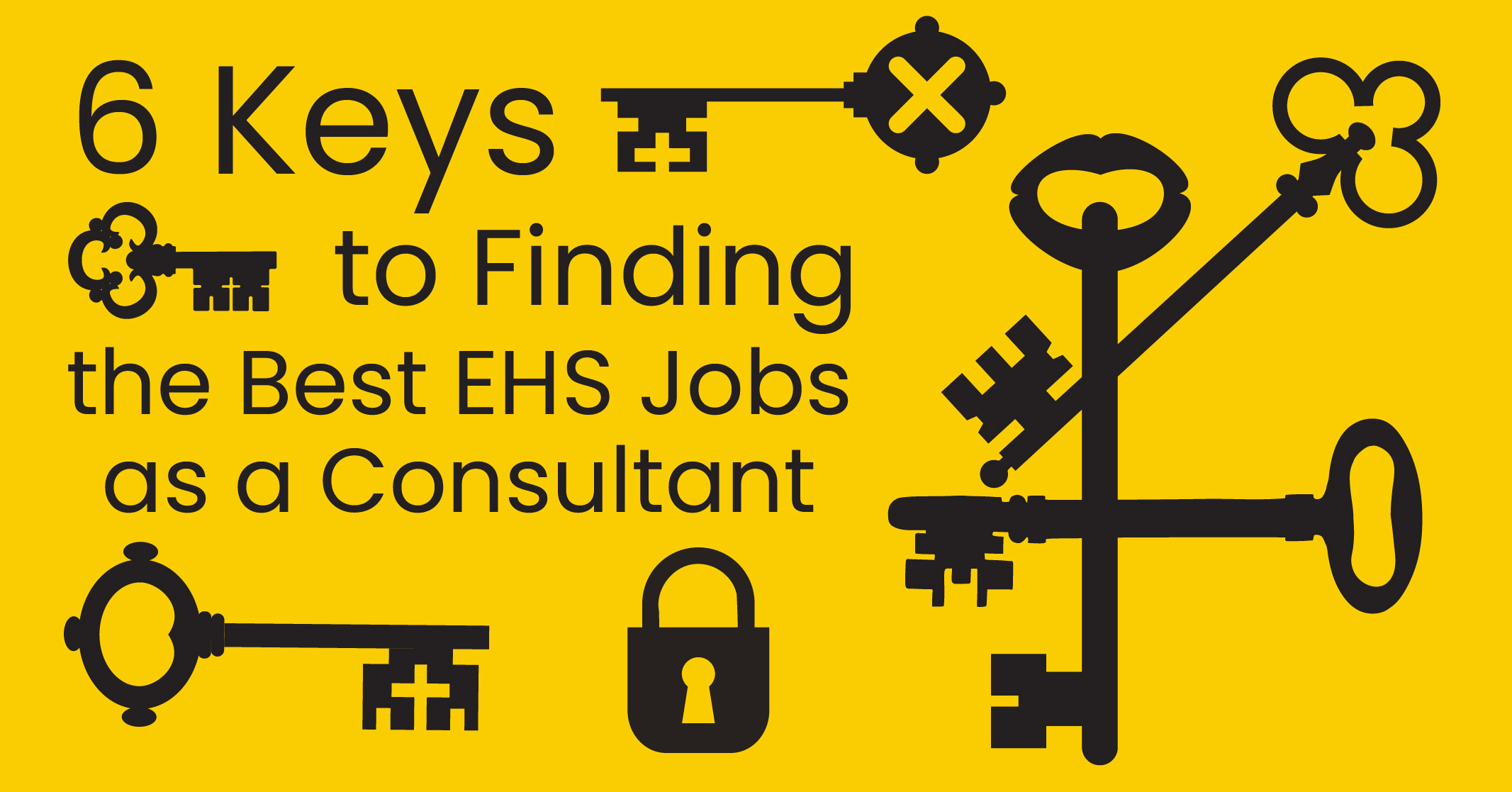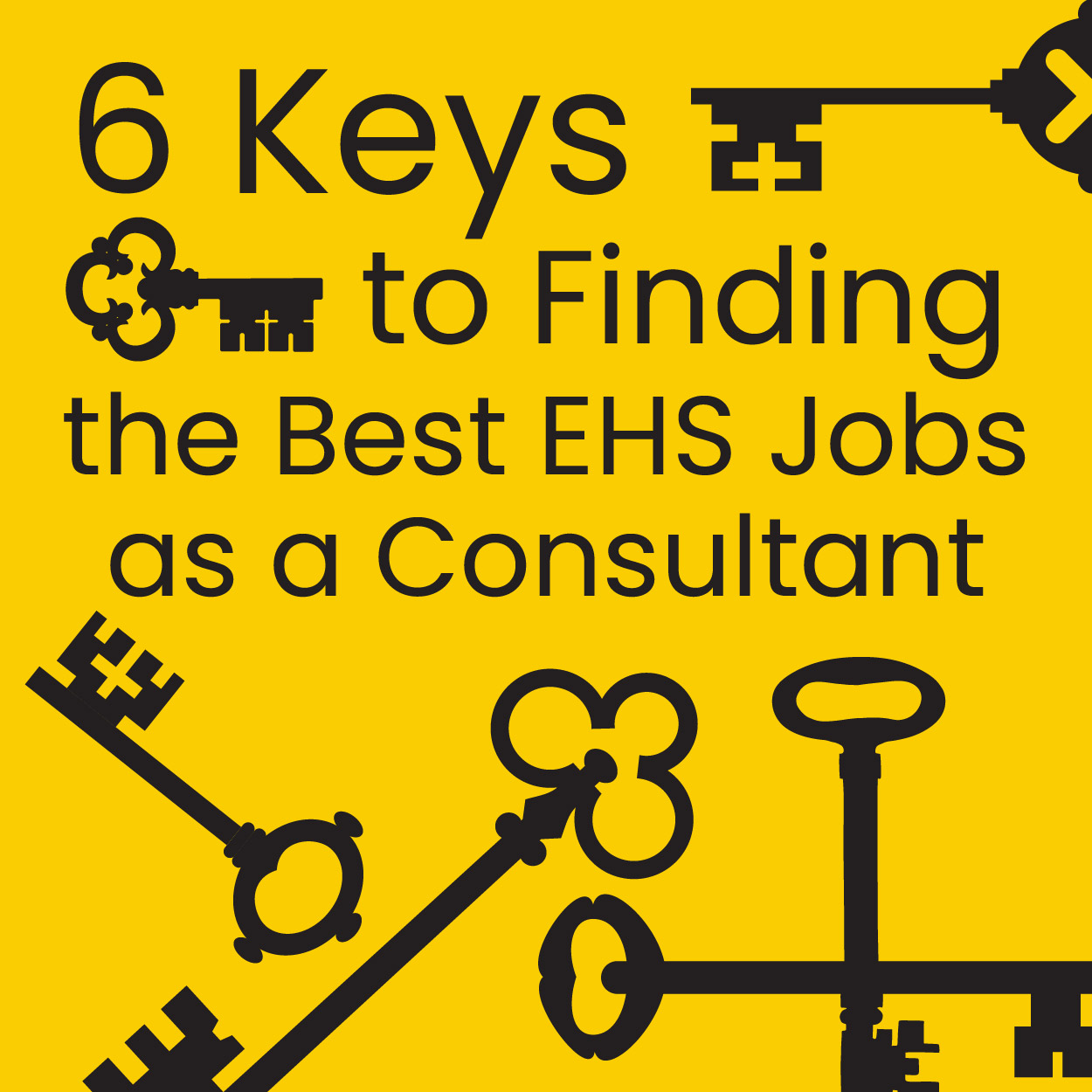
The 6 Keys to Finding the Best EHS Jobs as a Consultant
The demand for environmental health and safety (EHS) jobs has been rising. According to the Bureau of Labor Statistics (BLS), the EHS profession will grow by 7 percent per year between now and 2030. Additionally, the rise of the gig economy has opened the door for one-off, freelance, and contract work, giving EHS professionals numerous opportunities to find consulting jobs.
Although the EHS job market looks promising, it is still competitive. With so many EHS graduates and professionals looking for jobs, businesses have the pick of the lottery, making it difficult for EHS professionals to score the jobs they want. Learn how you can find the right EHS job opportunities and land the best consulting gigs.
How to Find EHS Jobs as a Consultant
EHS jobs exist for a wide range of specialty instructors and experts. From CPR and first-aid trainers to spill prevention, control, and countermeasure (SPCC) specialists, there are consulting jobs for most EHS professionals.
The first step to finding EHS consultant jobs is to find the right opportunities for your skillset. Here are some tips you should keep in mind when looking for the best EHS consulting gigs.
1. Showcase Your Expertise, Certifications, and Portfolio
As with any field, the first thing companies look at is your resume.
Companies are looking to hire professionals who will add value to their business. Because EHS professionals are generally not a cheap investment, businesses want to ensure the consultant is worth their money. Many of these projects deal with employee safety, dangerous hazards, and other impactful operational factors, so businesses are looking to hire individuals who know what they are doing and will not be a liability to the team. They want to hire consultants who can deliver the right advice and suggestions to help boost the company’s ESG score. As such, an EHS professional needs to put their accolades at the forefront to gain a business’s interest and trust. If you are a young professional who has only a few months of experience under your belt, you need to put a particular emphasis on your certifications and portfolio.
2. Leverage Referrals and Network Like a Pro
Because they are dealing with the most sensitive and important areas of a business, EHS professionals need to gain a high level of credibility to win a consulting contract.
As such, referrals can make or break your ability to land a consulting job. To gather the referrals you need, work with your fellow EHS professionals and network with past-project contacts to find new opportunities. You should also consider bolstering your LinkedIn profile to seek like-minded contacts who can help you land a job.
If you don’t know anyone who can help you, try making new connections by commenting on a post or joining a conversation. When communicating with new contacts, don’t make yourself and your joblessness the focus of the conversation. Instead, you should offer the participants something of value — remember, networking is not about asking people to give you a job. Networking is about building relationships and establishing yourself as part of a larger community, so make sure to ask people for information that will help you in your job search. Be a good conversationalist and let others speak — ask them for their opinion and listen to their stories.
Networking can also help you find jobs that you won’t ordinarily find online or through an employment agency. These include “pocket listing gigs,” which are jobs that have yet to hit the market. By finding out about these jobs before anyone else does, you can get your foot in the door and make yourself stand out to those in charge of hiring.
3. Do Your Own Research
You need to vet every job listing you come across, particularly the ones you apply to.
If you don’t do your due diligence, you may end up applying to a company that doesn’t meet your expectations or align with your personal values. Look into the business’s mission statement, work culture, branding, and employee reviews, and any past history regarding environmental, cultural, or safety concerns. Be as thorough as possible and be wary if you see several negative reviews. Just because a consulting gig exists or is offered to you doesn’t necessarily mean it’s a good fit. As an EHS professional, you don’t want to set yourself up for failure and walk into a consulting job that has little chance of success. You need to protect yourself, your reputation, and your work resume — that means looking beyond a 300-word job posting.
4. Evaluate Job Descriptions With a Magnifying Glass
In the same vein, you need to look at job descriptions with a magnifying glass. Look at every word and read between the lines.
Consider the following:
- Is the job description detailed and thorough?
- Is the job description consistent with the company’s mission statement, branding, and history?
- Does the company know what’s required of an EHS professional?
- For example, does the company mention what kind of certifications are required?
- Will the company give you the support and equipment that you need to do your job?
If the answer to most or all of these questions is no, it may not be a good job opportunity for you. To save time and energy, you should apply only to job positions that fit your expectations.
5. Think About the Money
Pay is another important aspect you need to consider before taking on a job.
EHS professionals are highly specialized individuals who bring a tremendous amount of value and expertise to a company. As such, you need to find a company that is willing to offer a fair or above-market rate for your consulting services. Be suspicious of companies that are reluctant to give you proper compensation — they may not understand the value you add and the specialized tasks they’re hiring you to complete. You want to work for a company that recognizes the impact EHS professionals deliver and is willing to invest in your service. An agreed-upon competitive compensation is a good litmus test for knowing if the consulting job will be with an informed and fair client.
6. Work With an EHS Job Placement Company
Finally, you should consider working with an EHS job placement company to land you the top-tier EHS consulting gigs on the market.
By working with a company like YellowBird, you’ll be able to get paired with job opportunities that fit your background and specific skillset. Hundreds of thousands of companies are in need of contract work from EHS professionals every year. Here at YellowBird, we are a two-sided marketplace that matches companies and professionals, while handling all of the onboarding for you.
In as little as two hours, we’ll match you with potential EHS jobs. Alongside that, we will manage communications with the client, organize scheduling, and solidify payments and billing for you. Ready to find your next gig? Get started here.
Why EHS Jobs Will Remain in Demand
EHS jobs will remain in demand for the foreseeable future due to the versatility EHS professionals can provide in numerous consulting capacities.
First, EHS professionals are in high demand across a variety of industries, including but not limited to manufacturing, construction, government, and healthcare. This gives EHS professionals a wide range of job opportunities throughout the year.
Second, there is an increased awareness and pressure for businesses to achieve a good environmental, social, and governance (ESG) score. The ESG score is a set of standards that socially conscious customers and investors use to screen potential purchases and investments. It examines how well an organization does on the following criteria:
- Environmental: This examines how well a company protects our natural world by looking at the initiatives the company has undertaken to address climate change, deforestation, air pollution, water pollution, water scarcity, carbon emissions, and other pressing environmental issues.
- Social: This metric looks at how well the company manages relationships with customers, employees, suppliers, and local and global communities. It does so by asking what steps the company has taken to address mental health issues, data security and hygiene, diversity, and community relations.
- Governance: This category vets the quality of the company’s leadership, shareholder rights, and internal controls. It does so by looking at the organization’s political contributions, the makeup of its board of directors, its onboarding and hiring practices, its lobbying, and compensation for its executives and venture partners.
The higher a business’s ESG score is, the more reputable it will be in the eyes of the public. According to McKinsey, there has been a surge of interest in ESG issues among customers, and especially investors. The same study reveals that in the U.S. alone approximately a quarter of assets under management — which amounts to $12 trillion — are ESG-rated investments.
As such, many businesses want to maximize their ESG score by creating a safe, environmentally forward, and culturally appropriate workplace that attracts and retains employees and garners support from customers. This gives EHS professionals opportunities to land consulting jobs as these organizations look for areas of improvement and forward-thinking.









